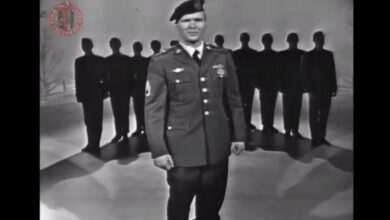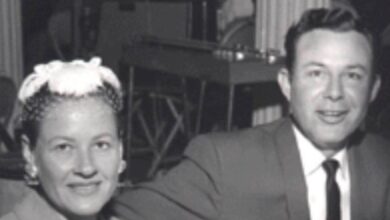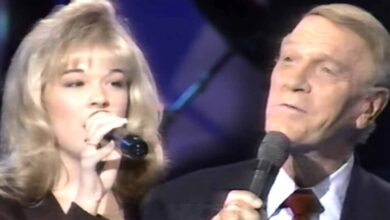Exhausted, He Performed Iconic Songs For The Final Time
Hello, I’m Johnny Cash,” a phrase that was not just an introduction, but a declaration of identity. Cash, often hailed as “The Man in Black,” carved out a distinct space in the landscape of American music with his resonant baritone and a flair for storytelling. His music transcended simple melodies, becoming a powerful vehicle through which he shared tales of love, hardship, and redemption. One of his most notable early works, “Folsom Prison Blues,” released in 1955, encapsulates the themes that would permeate his vast discography. With its haunting narrative of regret and longing, Cash established himself as a voice for the underrepresented and the disillusioned, embodying the struggles of those often overlooked by society.
Johnny Cash’s life was a tapestry woven with triumphs, struggles, and personal demons. His rise to fame began in the mid-1950s, when he signed with Sun Records, where he recorded a series of hits that would cement his place in music history. However, Cash’s journey was not without obstacles. He grappled with substance abuse problems, which often shadowed his success and led to moments of despair. These challenges did not silence him; rather, they enriched his songwriting, giving depth to the themes of redemption and resilience present in his music. His ability to channel pain into art garnered him a loyal following and critical acclaim, as listeners found solace in his honesty and authenticity.
As the years passed, Cash’s musical style evolved, but his core themes remained consistent. He often delved into topics like faith, love, and social justice, which resonated deeply with his listeners. This evolution culminated in his legendary performances at prisons, including the notorious Folsom State Prison in 1968, where his concert aimed to bring hope to inmates and reverberated beyond those walls. This event marked a pivotal moment in Cash’s career and showcased his commitment to advocating for the marginalized through his music. The live album recorded at Folsom Prison became one of his most iconic works, blending his passion for music with a heartfelt message of empathy and understanding.
Central to Johnny Cash’s narrative is the profound relationship he shared with June Carter Cash. Their connection began as a friendship steeped in mutual admiration and respect, evolving into a romantic partnership that would impact both their lives and careers. June, a strong and talented musician in her own right, played an instrumental role in Cash’s recovery from addiction. The couple’s collaboration brought forth some of the most memorable duets in country music history, including the beloved song “Jackson.” Their musical chemistry was palpable, and their personal struggles often mirrored the themes they portrayed in their music, creating an intimate connection with their audience.
The legacy of the Carter Family loomed large in Johnny Cash’s life, particularly through his marriage to June. The Carter Family, known for their pioneering contributions to American folk and country music, provided an authentic backdrop to Cash’s artistic journey. June was a direct descendant of Maybelle Carter, a foundational figure in the genre, and her influence on Cash was profound. Together, they honored this legacy while also forging their own path, integrating traditional sounds with modern sensibilities. Their time together enriched not just their own lives, but also the fabric of country music, intertwining their narratives with those who came before them.
Johnny Cash’s last performance at the Carter Family Fold on July 5, 2003, held deep significance, encapsulating the culmination of his life’s work in music. Despite facing severe health issues, including the challenges posed by Shy-Drager syndrome, Cash took the stage with unwavering determination. His performance that night was a testament to his indomitable spirit and a poignant display of his love for music. Singing alongside June might have been a bittersweet experience, as they had recently endured the loss of their beloved partnership, but together they created a moment that would resonate in the hearts of those present.
Cash’s health continued to decline after that performance, further complicating his life. The loss of June just four months later added to the weight of his struggles. This period of his life was marked by profound grief, yet Cash remained connected to his music. He found solace in writing and recording, releasing several notable albums, including “American IV: The Man Comes Around,” which featured covers and original compositions steeped in the themes of mortality and reflection. These works served as both a farewell and a celebration of his legacy.
When Johnny Cash passed away on September 12, 2003, at the age of 71, the world mourned the loss of an extraordinary artist. His music left an indelible mark on country music and beyond, influencing countless artists across genres. From rock to folk to punk, Cash’s music transcends boundaries, and his storytelling approach continues to inspire new generations of musicians and fans alike. His legacy is a mosaic of resilience, love, and a deep connection to the human experience.
The posthumous recognition of Johnny Cash has further solidified his status as a cultural icon. His life story, marked by romance, struggle, and eventual redemption, resonates deeply with people from all walks of life. Biographies, documentaries, and films about his life and music have emerged, keeping his spirit alive and introducing his artistry to new audiences. Cash’s songs, with their heart-wrenching lyrics and evocative melodies, remain relevant, capturing the essence of human emotion and experience.
This enduring impact prompts reflection on the power of music as a universal language that can articulate the complexities of existence. Johnny Cash embodied that power, wielding it to share stories of love, loss, and hope. Each note and each lyric serve not just as entertainment, but as a profound commentary on life itself. As we listen to his music today, we are reminded of the timelessness of his messages, the compassion that fueled his art, and the legacy of “The Man in Black,” a true legend whose voice will forever echo through the corridors of music history.





